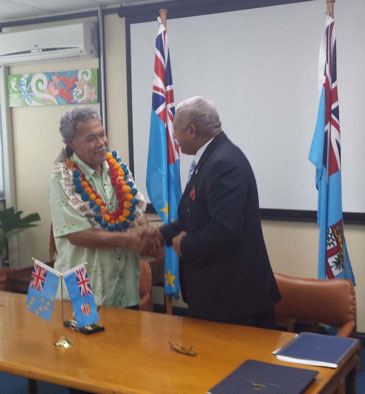
Wednesday 22 October 2014 – Secretariat of the Pacific Community (SPC) – Suva, Fiji: Last Friday was an important occasion for the governments of Fiji and Tuvalu as a maritime boundary agreement was signed by the Prime Minister of Fiji, Honourable Voreqe Bainimarama, and the Prime Minister of Tuvalu, Honourable Enele Sopoaga. This signing event concluded many years of negotiations between senior government officials of both countries.
The Secretariat of the Pacific Community (SPC), through its Applied Geoscience and Technology Division (AGTD), assists member countries in the technical preparations of negotiations between neighbouring countries to legalise the extent of national areas of jurisdiction under the United Nations Convention on the Law of the Sea (UNCLOS). The Regional Maritime Boundaries Unit within AGTD coordinates this support to member countries, working closely with its partners, which include the Pacific Islands Forum Fisheries Agency, Geoscience Australia, the Commonwealth Secretariat, the United Nations Environment Programme GRID-Arendal Centre, the Australian Attorney General’s Office and the University of Sydney.
The Pacific Islands region has approximately 48 shared maritime boundaries, where neighbouring exclusive economic zones overlap. Counting the treaty signed between Fiji and Tuvalu last week, 33 of these boundaries are subject to a formal treaty.
During the signing ceremony, PM Bainimarama stated, 'As Pacific small island developing states, we have proven to the international community that we are no strangers to concluding highly technical and complex negotiations under the UN Convention on the Law of the Sea.'
He paid tribute to the members of the Government of Fiji's Maritime Affairs Coordinating Committee (MACC) for their hard work in coordinating this work with SPC, particularly the Applied Geoscience and Technology Division and the project partner organisations mentioned above.
PM Sopoaga of Tuvalu expressed his gratitude to the Government of Fiji for its support in finalising this agreement, and also expressed his appreciation for all the other areas of support which have been shared with the people and the Government of Tuvalu.
This signing event marks another milestone as SPC, through its Regional Maritime Boundaries Unit, continues to provide support and advice to Pacific leaders as they work on the remaining negotiations in the region.
The successful preparation of this agreement between Fiji and Tuvalu has been the result of the excellent collaborative work between the respective technical and legal country teams. These include, in Fiji, the Ministry of Foreign Affairs, the Ministry of Lands and Mineral Resources, the Attorney General’s Office, the Fiji Navy and the Fiji Islands Maritime Safety Administration and, in Tuvalu, the Government of Tuvalu’s Department of Lands and Survey and the Attorney General's Office.
Photo caption: Prime Minister of Tuvalu, Honourable Enele Sopoaga on the left congratulating the Prime Minister of Fiji, Hon. Voreqe Bainimarama after signing and exchanging the treaty documents in Suva, Fiji.





